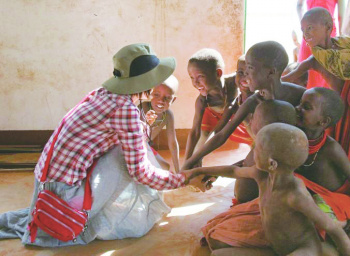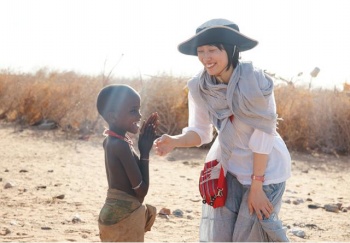
Park is the project manager of an NGO (non-governmental organization) named HoE, short for “Hope is Education.” HoE is based on Park’s belief that education is the key to unearthing people’s hidden potential.
“It is true that well-made classrooms and buildings play a crucial role in education,” Park said. “However, what is actually happening inside those schools tends to be overlooked. Teachers in Africa need to be educated as much as their students so that they can give lessons more effectively.”
In Africa, the labor cost of teachers is relatively low compared to that of other countries. It forces the teachers to engage in other businesses alongside teaching, which makes it hard for them to concentrate on their educational duty. For the sake of this situation, Park founded HoE to build African schools and educate the teachers. She believes that this can lighten the future of Africa.
“The essence of true education is the relationship between teachers and students,” Park said. “One educated teacher can influence numerous children’s lives. It will eventually bring hope and development to the entire continent.”
It may seem that Park successfully carved the way to her dream with ease. However, despite being a law graduate from a prestigious university, it took her a long time to discover what she really wanted to do.
“During my university years, I enjoyed taking part in various fields such as music or club activities which were far from my major and academics,” Park said. “It made me realize something very important – that I am a passionate person.”

After graduating from Ewha, she had to face the difficulty of unemployment. More than 40 times of failure discouraged Park and made her tremble thinking about her future and dream. Everything seemed gloomy to her. However, Park recalls it was the period during which she could contemplate her true self and ego.
“At that time, I could not accept my failure as I thought I had tried my best,” Park said. “The truth is, however, how could I have gotten myself a job when I did not even know the answer to the question of ‘who am I?’ Now, everything makes sense.”
Her opportunity came when she engaged in a global volunteering program in Indonesia in 2006. She was surprised that the situation did not seem as chaotic as she had imagined. Living far away from the intense Korean society full of competition, she realized the true meaning of happiness. Park’s experience of working as an intern in NGO International led her to found HoE in 2009.
“HoE started with 16 people in Room B219 of the Ewha Campus Complex,” Park said. “My two sisters and parents fully supported me, which gave me the courage and hope to make my dream come true.”
For Park, Ewha is the symbol of her dream. She relates HoE to Ewha since the school started with only one student taught by Mary Scranton.
“Now, Ewha is one of the most prestigious universities in Korea,” Park said. “If I did not attend Ewha, I would not have achieved all this work. Also I can give hope to African parents with daughters through the name of Ewha.”
Park advises university students to consider every moment worthwhile and appreciate all the responsibilities no matter how trivial they are.
“Do not let the opportunity slip away because it seems too small,” Park said. “Start from trivial chances and the process will eventually take you to the biggest chance that can change your whole life.”

